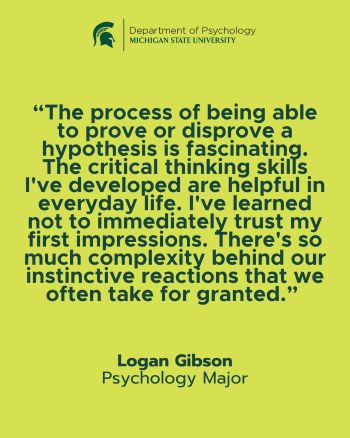PSY Student Research Spotlight with Logan Gibson
April 4, 2025 - Shelly DeJong
 Logan Gibson, a junior majoring in psychology with minors in Cognitive Science and Quantitative Data Analytics, has found a passion for psychology research during his time at MSU. He recently received the Dean’s Assistantship Award which allows him to explore his research interests with Dr. William Chopik’s Lab—and will soon be presenting at UURAF. We met with Logan recently where he shared about what he likes about research, what he will be presenting at UURAF, and who has helped him along his way.
Logan Gibson, a junior majoring in psychology with minors in Cognitive Science and Quantitative Data Analytics, has found a passion for psychology research during his time at MSU. He recently received the Dean’s Assistantship Award which allows him to explore his research interests with Dr. William Chopik’s Lab—and will soon be presenting at UURAF. We met with Logan recently where he shared about what he likes about research, what he will be presenting at UURAF, and who has helped him along his way.
Why psychology?
Majoring in psychology has been a gradual journey for me. I developed an interest in psychology back in high school when I took AP Psychology, but initially, I thought I wanted to pursue astrophysics. I was captivated by space and everything related to it. However, I began to realize that my daydreams and questions often revolved around understanding how people think and behave, particularly regarding how we learn.
What intrigued me about space and astrophysics was its infinite complexity and the challenge of explaining difficult concepts in a way that the public could understand. Ironically, it was my fascination with astrophysics that inspired me to delve deeper into psychology. I read two books by Brian Greene, a theoretical physicist, and I was more impressed by his skillful use of analogies to clarify complex ideas than by the subject of space itself. This realization steered me toward my psychological interests.
In college, I started with general education courses, but I didn't find them particularly engaging. However, my experience changed when I joined Dr. Chopik's research lab. Each year, I’ve immersed myself deeper into research and my love for psychology has really blossomed.
What has surprised you about psychology research?
Originally, I had a stereotypical view of psychology experiments, imagining researchers putting a brain cap on someone and measuring something. However, much of the work actually revolves around data analysis. As I delved deeper, I began to appreciate that you can start with a question and arrive at an answer, which allows you to gauge your understanding of the topic.
 The process of being able to prove or disprove a hypothesis is fascinating. The critical thinking skills I've developed are helpful in everyday life. I've learned not to immediately trust my first impressions. There's so much complexity behind our instinctive reactions that we often take for granted. We still need to prove these assumptions step by step.
The process of being able to prove or disprove a hypothesis is fascinating. The critical thinking skills I've developed are helpful in everyday life. I've learned not to immediately trust my first impressions. There's so much complexity behind our instinctive reactions that we often take for granted. We still need to prove these assumptions step by step.
Being involved in research has deepened my appreciation for understanding how we know things because that has always been my primary interest: how we learn and acquire knowledge. Participating in research has allowed me to explore these questions further.
Tell us about your research with Dr. Chopik.
We are focused on how people's attachment orientations— their approach to relationships—affect their perceptions of life events. Specifically, we study anxious and avoidant individuals and how their attachment styles influence their outlook on various life situations.
We conducted a study involving participants who were asked to review a list of 21 life events. Each participant indicated whether they had experienced each event and when it occurred. Following this, they were presented with two hypothetical life events they had not experienced. We asked them to rate the likelihood that these events would change someone's personality. Interestingly, we found that individuals high in avoidance believed that most life events, even very dramatic ones like the death of a partner, would not significantly change someone's personality. On the other hand, individuals high in attachment anxiety acknowledged that a few specific traumatic events, such as the death of a close friend, romantic partner, and parent would likely change their personalities as well as moving to a new city, making a new friend and being the victim of a serious crime.
We then compared individual ratings of 9 life event characteristics for each life event. Notably, individuals with high attachment anxiety viewed marriage as particularly challenging. This aligns with the idea that those with anxious attachment may have had poor relationship experiences in the past, leading to concerns about future relationships. Marriage was one of the few areas where both anxious and avoidant individuals agreed that it might be challenging, which is interesting given that they often show opposing perspectives on many other life events.
Lastly, we collapsed the nine event characteristics across all life events to summarize how both anxious and avoidant individuals typically perceive life's challenges. We discovered that those with anxious attachment styles tended to find life events more challenging, impactful, emotionally significant, likely to impact their worldview, and potentially detrimental to their social status. In contrast, avoidant individuals rated events as less challenging, emotionally significant, impactful, and likely to affect their worldview.
Why do you think it's important to study things like this?
I think it's important to understand attachment styles to better navigate life events and relationships. Psychological research shows that many experiences we assume are unique are often shared universally. Recognizing that your attachment style affects your perceptions can be enlightening. It encourages you to reflect on why past events still impact you and what interventions can help you move forward.
This insight also helps you develop compassion for others. You can recognize the underlying forces that influence people's behavior, often beyond their control. As you learn more, you can extend more generosity toward others. You might realize that behaviors you once perceived as malicious or manipulative could stem from deeper challenges that the person may not even recognize. This understanding encourages a more compassionate approach to interactions, especially in relationships. More understanding always goes a very long way in relationships.
Would you like to give a shout out to anyone?
First and foremost, Dr. Chopik has been incredible. I joined the lab during my sophomore year, and he provided me with projects that allowed me creative control and valuable experience—opportunities I couldn’t have found elsewhere. His support throughout this process has been invaluable, helping me with these projects and giving me practice in areas like manuscript writing and, currently, presenting my research.
Secondly, my mentor through the Psychology Scholars Program, Dr. Cesario, has been instrumental in guiding me through the graduate school application process. He has demystified what was initially overwhelming and provided clear, concise advice on the steps I need to take in preparation for grad school. This guidance has been crucial to ensuring that my efforts are directed properly, especially since I aspire to pursue a PhD in psychology research.
Dr. Weaver was also instrumental in showing me how to apply for research opportunities and provided recommendations. I initially didn't get into Dr. Chopik's lab, but Dr. Weaver encouraged me to try again. I took his advice, and eventually, I got in. Since then, my experience has been nothing short of rewarding as I have progressed through this program and gotten to know the wonderful people in the psychology building.
I truly appreciate everyone’s help; I could not have accomplished all of this on my own. Their collective guidance and support have made a significant difference in my journey, and I am immensely grateful for each and every one of them. They are all great people.

